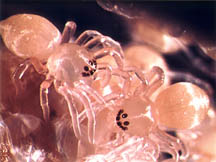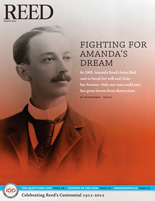
IRIS login | Reed College home Volume 90, No. 1: March 2011
Webmaster (continued)
David Frazee Johnson

"Grandpa, that's not how we do it."
The temperamental nature of spider embryos, Black says, made support from the Murdock trust especially helpful. “One of the things about working with spider embryos is that it’s just not easy,” he says. “Having good people in the summer helps move the project along, and gives them full-time immersion in the spider world and brings them up to speed in advance of starting a thesis. The support from the Murdock Trust was invaluable.”
![]()
The NIH grant allowed Black to cast an eye towards his project’s future, stock his lab with supplies, hire student researchers over the summer, and, most important, hire a full-time technician (Kay Larkin ’91) to provide a consistent level of expertise in the lab.
Dean of the faculty Ellen Stauder notes that Black’s work speaks to the value of faculty research that is so closely connected to Reed students. “Steve’s lab is a space where artificial distinctions between teaching and research break down,” she says. “The institutional support Reed has given Steve and his students has supported not only their projects but also this model of doing scientific teaching and research. His success in receiving external funding is a testimony to the value of Steve’s scholarship to the scientific community. We’ve made support for faculty research such a vital part of the Reed Centennial Campaign because we want to provide this kind of targeted support to more faculty like Steve.”
With the lab up and running, staffed by an eager crew of student researchers, and generating scholarly publications, the natural question concerns where Black will turn his attention next. “The standard answer to that is that you want to bore down and go completely molecular and understand the molecular mechanisms for everything the embryo is doing,” he says. “However, my lab’s strength is in cell-level analysis of the entire embryo. Nobody else is looking at how the embryo actually assembles—my goal in the next few years is to understand the diversity of design solutions for making a spider embryo.”
Looking around the lab, with its eight-legged specimens and its arachnophile décor (complete with a homemade “spider bite kit”—cocktail shaker, glass, and a bottle of Tanqueray), one would never guess that Black was once a neophyte in this unusual field. “I’ve had such good fortune here,” he says, reflecting on his career at Reed. At many schools, he notes, curious and motivated undergrads are the exception.
“I guess I’m cursed,” he chuckles. “I’ve had them from day one.”
- Previous Page
- 1
- 2
- 3
- Next Page


LATEST COMMENTS
steve-jobs-1976 I knew Steve Jobs when he was on the second floor of Quincy. (Fall...
Utnapishtim - 2 weeks ago
Prof. Mason Drukman [political science 1964–70] This is gold, pure gold. God bless, Prof. Drukman.
puredog - 1 month ago
virginia-davis-1965 Such a good friend & compatriot in the day of Satyricon...
czarchasm - 4 months ago
John Peara Baba 1990 John died of a broken heart from losing his mom and then his...
kodachrome - 7 months ago
Carol Sawyer 1962 Who wrote this obit? I'm writing something about Carol Sawyer...
MsLaurie Pepper - 8 months ago
William W. Wissman MAT 1969 ...and THREE sisters. Sabra, the oldest, Mary, the middle, and...
riclf - 10 months ago